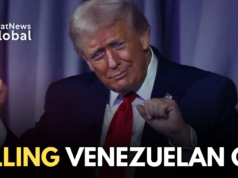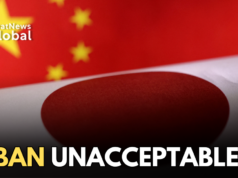NEW DELHI: In 2007, the Chinese economy recorded a stupendous growth of 14.2%. Fifteen years later, the International Monetary Fund (IMF) projects that economic growth will slow to 3.2% this year. In fact, the country may be lucky to log this, given the rapidly deteriorating global situation.
Indeed, this is a stunning slowdown. And that too for an economy which the IMF estimates to be a staggering $20.26 trillion—the second largest in the world behind the United States.
More importantly this slowdown coincides with an imminent third term for President Xi Jinping. Surely, while he will be savouring the personal milestone, the President must be worried about the state of the economy. After suffering its worst shock ever, the economy has taken more than just a stumble.
China’s pursuit of a zero-Covid policy has only made a bad situation worse. Foreign manufacturers with a base in China are already scrambling for safety; and the moniker for this is “one-plus”. The decision by Apple to manufacture the iPhone in India is one such example.
Yet the Chinese establishment refuses to blink. It remains steadfast in its commitment to a zero-Covid policy, even while local governments already stretched, struggle to meet their development targets. It is baffling to say the least.
Luckily for me the conversation with Richard Martin, managing director of IMA Asia, for my latest episode on StratNews Global was more than just helpful. Richard unpacked the knots to draw some dramatic conclusions about the present and the troubled future of the world’s second largest economy.
The Pivot
Logically one would expect that reviving growth would be the big priority for the Chinese authorities. Surprisingly, it is not. In a must see conversation with me for the weekly episode of Capital Calculus telecast on StratNews Global last Thursday, Richard said:
“I think the thing that has become clearer to us about China this year is that it is not so interested in growth. It is not interested in the GDP number, you know; all of us thought it was going to aim for 5%. That is not its goal; not its goal this year, probably not its goal ever in the future, at least under the leadership we have got.”
And this Richard argued is part of a well-thought-out plan:
“It is not really the China we thought we were going to be seeing, you know, they’ve turned away from that concept when they joined the WTO, back in 2001, of becoming a market-led economy. It is going back to being a party-led and a state owned enterprise-led economy. And that’s a pretty big shift.”
What then are the new priorities?
“(First) China wants to be a successful Communist Party-led state. And that is a really dominant goal this year that they are paying attention to; you could say, they have sacrificed growth to achieve that goal.
A second thing is they want China to be a powerful national player, at least equal to the United States. So there’s a big push on nationalism and try to force China’s line on global politics, interpret things the way China sees it.
And then the third thing, it really wants to be a technology leader, and of course, that’s leading into a pretty tough battle. At first, it was just with the United States, but it looks it is going to be broader.
So that is I think one of the big things we’ve learned about China this year; they are just not focused on growth and that they’ve got other goals. It is about what China wants to be.”
The Fallout
This big pivot is coming at a severe economic cost. Worse, as the shadows of recession lengthen over the United States and Europe, it means that exports, the one engine which previously powered the Chinese economy, will start to lose more steam. Worse, foreign companies are already beginning to walk the talk on the ‘one-plus’ strategy.
“The Chinese economy is at one of its weakest points in recent memory,” Shehzad Qazi, managing director of China Beige Book, a company that generates large-scale, private data on the Chinese economy, told CNBC. “Compared to year ago levels, you’re seeing major drops, and almost every sector is struggling.”
The downside risks to the Chinese economy, especially those emanating from the property market which accounts for a third of the country’s national income, are indeed worrying.
Richard echoed Shehzad’s views.
“The other ripple effect you get is the consumer sentiment in China. The National Bureau of Statistics does a survey on this, you know, their own statistics office; it crashed three or four months ago. I mean, since the index came out in 1990, it has never been as low; it has just gone through the floor.
And that is because the average Chinese household has 60% of its wealth tied up in property. That’s extraordinary over exposure to the property sector. So if the property sector goes, you can write off the Chinese economy. So the ripple effect is big, more like a tsunami effect.”
As the second largest economy in the world and one that is so deeply entwined with the fortunes of so many countries, the implications of a slowing or, worse, an imploding Chinese economy will be devastating.
Interestingly, Richard argues that it could actually work both ways for the Asia-Pacific region:
“There are two big things to watch, which really do affect the rest of the region. One is tourism. Outbound Chinese tourists were gigantic over the last decade, and went from zero per cent of tourism inflow across Southeast Asia to 25-30%. And it really drove Thailand, Philippines, Malaysia and Singapore as well. (It was) Even important for Taiwan, Japan, and Korea. This is not going to restart next year. So that is a loss for everyone.
The second thing is a bit more positive for the rest of the region. We are seeing export operations, relocating, not all of them, but some of them.
You can actually see it in the statistics; go look at U.S. imports statistics, China’s share hit a peak 22% of U.S. imports four or five years ago. Now I think it is down to about 18% and steadily falling. The big winners so far have been Mexico and Vietnam.
I think more will go into Southeast Asia; Malaysia will get some, Thailand will get some. It will be interesting to see if India is a big mover in this regard.”
It is clear that for President Xi, winning the political battle to claim an unprecedented third term at the helm was the easy part.
The more difficult challenge will be negotiating the economic crisis. Either way, the outcome has grave implications for the world in general and Asia in particular. After all, erosion of economic heft will also mean that much less global clout.
(The author is a columnist and hosts a weekly show called ‘Capital Calculus’ on StratNews Global. Views expressed in this article are personal.)
Anil Padmanabhan has been a journalist for the last 36 years. He has worked in various capacities in several publications including Afternoon Despatch & Courier, Press Trust of India, Business Standard, Mint and was based in New York for India Today. He was a Nieman Fellow in 2001. He tweets at @capitalcalculus.





